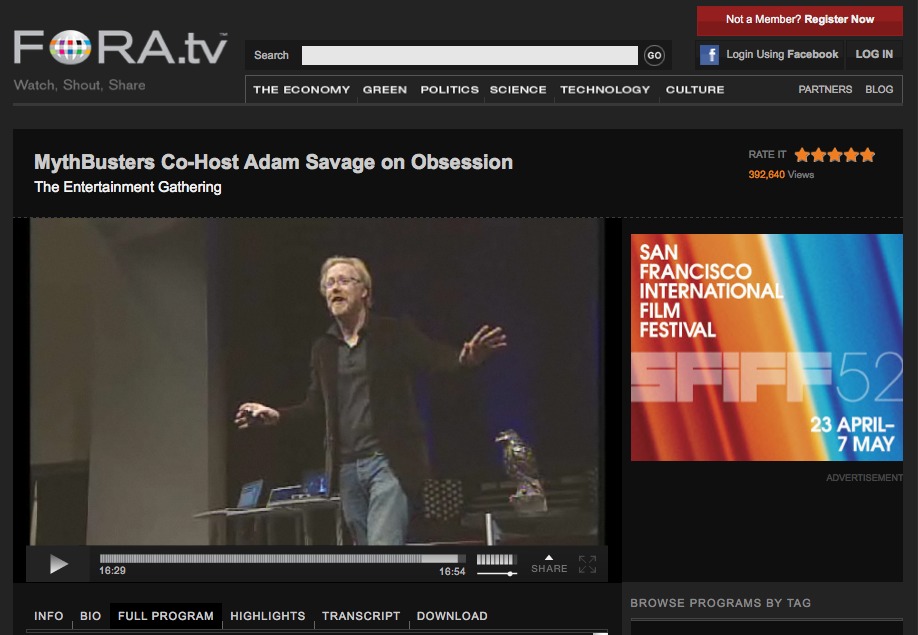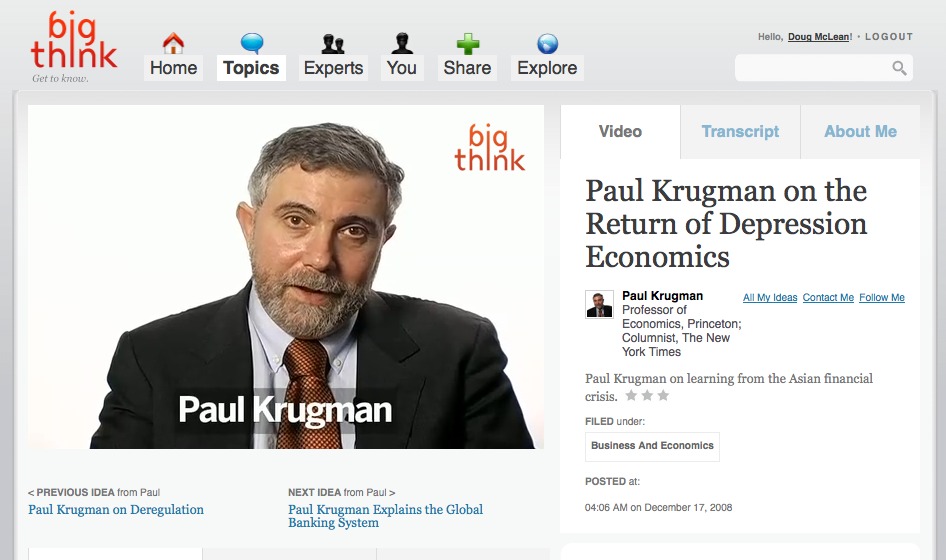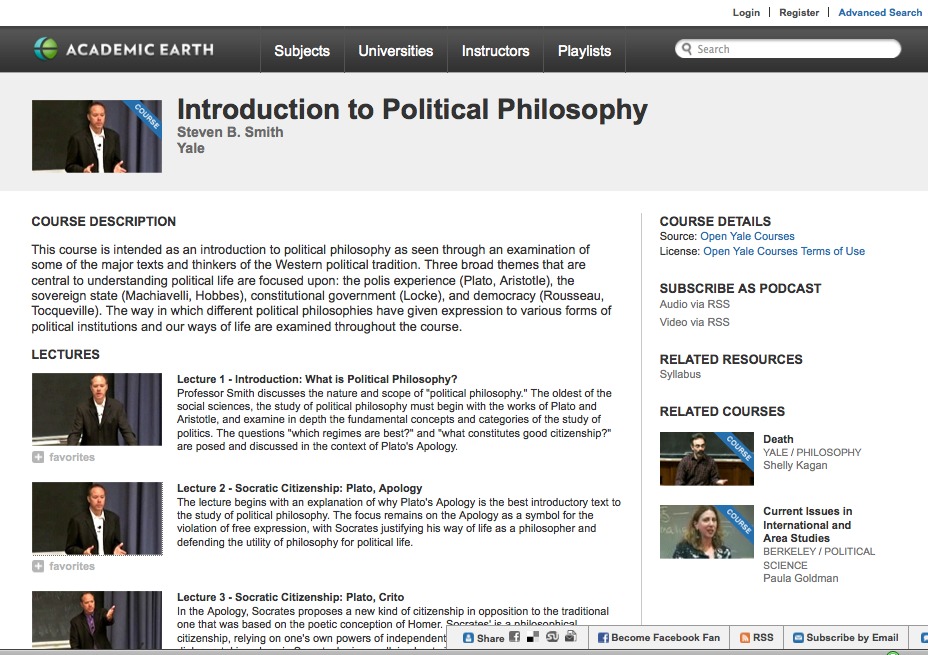Welcome to Internet U, via Video
I was raised on the most successful initiatives from Public Television, or ETV as it was previously known (E standing for Educational of course). Sesame Street, 3-2-1 Contact, Mister Rogers’ Neighborhood, and Reading Rainbow were my bread and butter as a kid. And yet while those educational programs were major successes, television’s promise of bringing education and instruction to a wide audience was left largely unfulfilled in the United States.
Proponents of educational TV faced the harsh realities of the large amounts of funding required to create and maintain television programing. The need to satisfy the large and diverse communities that helped raise those funds also made it difficult to sustain certain kinds of programing, especially those that failed to blend education and entertainment into an easy-to-swallow medicine.
The Internet, on the other hand, is arguably a more fertile marketplace for education programming because of the relatively low cost of production, and the ability to target niche audiences with more specific kinds of instruction and coverage.
Mac users may already be familiar with iTunes U, the educational section of the iTunes Store that’s loaded with free content like university lectures, commencement speeches, and interviews. Another well-known resource is TED Talks, the popular site featuring short lectures by field leaders from the annual TED (Technology, Entertainment, Design) conference.
But there are other sites that offer excellent educational videos, despite being less well-known, including FORA.tv, Big Think, and Academic Earth. These sites offer a glimpse of what educational TV can be when unfettered from the massive costs of producing mass market content.
Roundup of Rhetoric from FORA.tv — FORA.tv focuses on public lectures, roundtables, and debates. The site’s main menu is broken down into six primary categories: The Economy, Green, Politics, Science, Technology, and Culture. While everything on the site falls into one of these categories, you can also search by tags, which include more specific sub-groups such as Books, DNA, Education, Muslim World, and Wireless. You can also sort through content by partner – the organizations and groups that upload videos to the site. Of the many partners, some of the more prominent and prolific ones include C-SPAN, the New School, and the Brookings Institution.
FORA.tv’s site design is easy to navigate, and deftly displays the additional information provided for each video. During any given playback, you can sort through tabs located below the video which include Info, Bio, Full Program, Highlights, Transcript, and Download. Not every video offers all of this additional content – many videos don’t come with a transcript, for example. But many do, and being able to thumb through a speaker’s biographic information, or locate speech highlights while watching the video, is convenient. Each video is also accompanied by a list of recommended related talks – it’s not an innovative feature, but is much appreciated nonetheless.
Additionally, while all the content is in video form, the Download tab includes the option to download just the audio – perfect for those users without the time to sit and watch an hour-long lecture, but who would listen to it on an iPod while in the car.
Once registered, you can also leave comments and rate videos. The comments are handy, because ratings alone are a vague form of evaluation, and the comments give a better sense of what’s interesting or dull about a particular lecture and whether it’s worth your time. You can also opt to view a listing of the week’s most watched, commented, or rated videos.
While not specifically instructional, FORA.tv’s videos are educational, and the site’s compelling design, attention to detail, and quality of material make it worth bookmarking and checking back on regularly.
The Grand Aspirations of Big Think — The purpose statement of Big Think reads, “We’re a global forum connecting people and ideas.” It’s a lofty goal, creating yet another social network, this one focused around ideas and debate among a global community of experts and laymen. And while the site doesn’t quite hit its mark, there’s still good reason to check it out.
The main reason to visit Big Think is its collection of Expert videos. These are produced specifically for Big Think, with various field experts being interviewed against white backdrops. The videos are served up in bite sized morsels – usually less than 10 minutes long. The format is candid and relaxed, and it’s neat to see big-name people speaking directly to you as the viewer. If you have only a little time to spend, or just want a splash of information or ideas, they’re great. Usually each expert has at least a handful of videos, sometimes many more.
You can search for expert videos alphabetically, if, say, you have someone in mind you want to listen to; you can also search by subject. Some of the subjects are a little unusual for a site index, including topics like Life & Death, Outlook & The Future, and Inspiration. It’s a little hard to imagine how anyone besides a ghost or time traveler could be much of an expert on death or the future, but I give Big Think points for thinking outside the box. There are more traditional categories as well, such as Arts & Culture (I’ve been impressed by the depth of experts in the Arts), Business & Economics, and Science & Technology.
Unfortunately, their short length often makes Big Think’s videos less satisfying than more extended discussions or lectures available on other sites. Occasionally I wished a perspective or argument could be more fully fleshed out.
Aside from the Expert videos, Big Think has a lot to offer, but much of it is overwrought and cumbersome. The site simultaneously hosts the Expert videos, blog entries by the site’s editors and other writers, news links and coverage, and an extensive social networking facet focused on community discussion. The latter component is a large part of what bothers me. It comprises customized updates, discussions of ideas, messages, and friends. I admire Big Think’s goals, but the result is confusing and results in overload, at least with the current organization and design.
Furthermore, much of the user-generated content wasn’t worth reading. Most user articles and videos felt like people spouting off about topics they didn’t know much about, giving it the feel of an overgrown comments section. Ideally, the expert content would mingle with user-generated content to provide a rich discourse, but it just doesn’t gel. I recommend sticking with the Expert videos.
Academic Earth: Ivy League on the Cheap — Academic Earth is the most academic of these services. Its main objective appears to be to provide access to university lecture courses in their entirety. Participating schools currently include Berkeley, Harvard, MIT, Princeton, Stanford, and Yale. Considering how much you’d have to pay to attend even one of these courses in person, Academic Earth is an amazing bargain.
You can follow along in full with courses like “The American Novel Since 1945” at Yale, or “Computer System Engineering” at MIT. Or you could learn a whole heck of a lot about entrepreneurship – for some reason there are almost 1,000 lectures on that subject alone (mostly from Stanford, presumably for all the Silicon Valley entrepreneur wannabes); way more than any other subject currently represented.
Academic Earth’s site design is simple and clean, making it easy to navigate and find what you’re looking for. You can search for lectures by subject, university, instructor, or playlist – groups of lectures grouped by different themes or ideas. Surprisingly, there is little opportunity for users to generate content. While you can “grade” lectures, Academic Earth’s equivalent of a rating, there is currently no commenting system. Thinking more on this, it occurred to me that perhaps this is to maintain the philosophy of the lecture. That is: professor talks, students listen. That said, on a pragmatic level, it also eliminates the need for an online moderator or teaching assistant for these courses. From a user perspective, the absence of
comments helps keep Academic Earth clean and clutter free, and I’m all for that.
While you can’t comment or engage in discussion, you can share videos via Facebook, del.icio.us, Digg, or via several other sites and services. You can also embed videos, create a list of favorites, download the lectures (as audio or video), and subscribe to podcasts. Lecture transcripts and reading assignments are also sometimes available, depending on the course. Finally, you can easily acquire a proper citation for any given video – the lecture’s information is put into correct bibliographic format and made available for you to copy and paste.
In time, I hope Academic Earth expands its offerings to include more universities, and more importantly, more subjects. Out of all the educational sites I’ve seen, Academic Earth is the most exciting to me, and the depth and richness of the instruction it provides is unparalleled.
Practical Pedagogy — For anyone who loves surfing Wikipedia articles or combing the Internet for savory bits of knowledge, these video-rich educational sites hit the spot. From the nuggets of expert insight on Big Think, to the compellingly relevant speeches on FORA.tv, to the dense and challenging lectures on Academic Earth, this trifecta covers a lot of ground and shows what “educational TV” can become when unfettered by commercial constraints.


